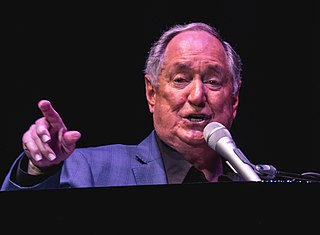
Neil Sedaka is an American singer, songwriter and pianist. Since his music career began in 1957, he has sold millions of records worldwide and has written or co-written over 500 songs for himself and other artists, collaborating mostly with lyricists Howard "Howie" Greenfield and Phil Cody.
Eruption were a British disco, R&B and soul recording act in the 1970s and 1980s. They are best known for their covers of Ann Peebles's "I Can't Stand the Rain" and Neil Sedaka's "One Way Ticket", which were big disco hits in 1978 and 1979.
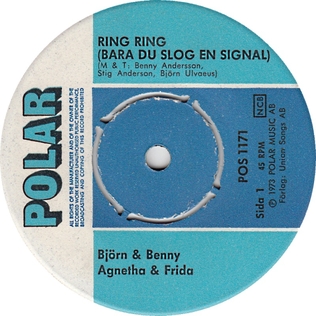
"Ring Ring" is a song by Swedish group ABBA, released as the title track of their 1973 debut album. The single gave the group their big break in several European countries (although the rest of Europe, North America and Australia would be introduced to ABBA the following year). The song was written in Swedish by Benny Andersson and Björn Ulvaeus, along with their manager Stig Anderson, with an original title of "Ring Ring (Bara du slog en signal)" ("Ring Ring (If Only You Called)"). Translation into English lyrics was helped by Neil Sedaka and his collaborator Phil Cody. The Swedish version reached No. 1 in the Swedish charts.

"That's the Way (I Like It)" is a song by American disco and funk band KC and the Sunshine Band from their self-titled second studio album (1975). The single became the band's second No. 1 hit in the Billboard Hot 100, and it is one of the few chart-toppers in history to hit No. 1 on more than one occasion during a one-month period, as it did between November and December 1975. It topped the American pop chart for one week, and then was replaced by another disco song, "Fly, Robin, Fly" by Silver Convention. "That's the Way (I Like It)" returned to No. 1 for one more week after "Fly, Robin, Fly" completed three weeks at the top. "That's the Way (I Like It)" also spent one week at No. 1 in the soul singles chart. The song is in natural minor.

"Laughter in the Rain" is a song composed and recorded by Neil Sedaka, with lyrics by Phil Cody. It includes a 20-second saxophone solo by Jim Horn. The song hit No. 1 on the Billboard Hot 100 in February 1975.
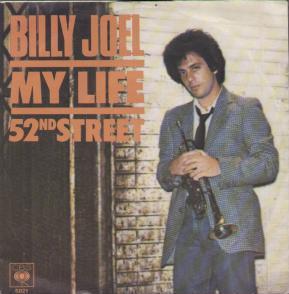
"My Life" is a song by Billy Joel that first appeared on his 1978 album 52nd Street. A single version was released in the fall of 1978 and reached No. 2 on the U.S. adult contemporary chart. Early the next year, it peaked at No. 3 on the Billboard Hot 100.

"Babe" is a song by the American rock band Styx. It was the lead single from the band's 1979 triple-platinum album Cornerstone. The song was Styx's first, and only, US number-one single, spending two weeks at No. 1 in December 1979, serving as the penultimate number-one single of the 1970s. "Babe" also went to No. 9 on the Adult Contemporary chart. It additionally held the number-one spot for six weeks on the Canadian RPM national singles chart, charting in December 1979 and becoming the opening chart-topper of the 1980s. It was also the band's only UK Top 40 hit, peaking at No. 6. It also reached No. 1 in South Africa.
"Don't Leave Me This Way" is a song written by Kenneth Gamble, Leon Huff and Cary Gilbert. It was originally released in 1975 by Harold Melvin & the Blue Notes featuring Teddy Pendergrass, an act signed to Gamble & Huff's Philadelphia International label. "Don't Leave Me This Way" was subsequently covered by American singer Thelma Houston in 1976 and British duo the Communards in 1986, with both versions achieving commercial success.
"Love Will Keep Us Together" is a song written by Neil Sedaka and Howard Greenfield. It was first recorded by Sedaka in 1973. The brother-sister duo Mac and Katie Kissoon recorded their version in 1973. American pop duo Captain & Tennille covered it in 1975, with instrumental backing almost entirely by “Captain” Daryl Dragon, with the exception of drums played by Hal Blaine; their version became a worldwide hit.

"Bad Blood" is a popular song written by Neil Sedaka and Phil Cody. The song, with uncredited backing vocals by Elton John, reached number one on the Billboard Hot 100 in 1975, remaining at the top position for three weeks. It was certified Gold by the RIAA and was the most successful individual commercial release in Sedaka's career. "Bad Blood" was replaced at the number one spot by John's single "Island Girl".

"I Can't Stand the Rain" is a song originally recorded by Ann Peebles in 1973, and written by Peebles, Don Bryant, and Bernard "Bernie" Miller. Other notable versions were later recorded by Eruption, Graham Central Station, Tina Turner and Lowell George. The original version is ranked at 197 on Rolling Stone's 500 Greatest Songs of All Time.
Precious Wilson is a Jamaican soul singer.
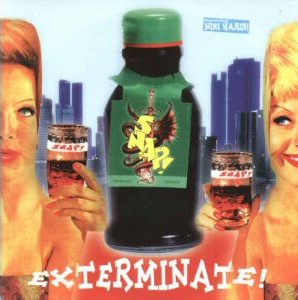
"Exterminate!" is a song by German Eurodance group Snap! featuring American singer Niki Haris, released in December 1992 by Logic Records as the third single from their second studio album, The Madman's Return (1992), and features vocals by the group's new front woman, Haris, who also is credited for co-writing it. Going for a more trance-like song than its predecessor, "Rhythm Is a Dancer", it is based on the track "Ex-Terminator" and was included in later editions of the album. Released first at the end of 1992, it was a hit in several countries, peaking at number-one in Finland and Spain, and number two in the United Kingdom, where it spent 15 weeks on the charts. The music video for "Exterminate!" was directed by Angel Gracia.

"Ain't Nothin' Goin' On but the Rent" is a song by American singer-songwriter Gwen Guthrie. It was released in 1986 as the lead single from her fourth album, Good to Go Lover (1986), on Polydor Records. It became the biggest hit of Guthrie's career, and the song's title became a semi-popular catchphrase among many women throughout the late 1980s and early 1990s. The single peaked at number five in the UK, but hit number one in New Zealand, Zimbabwe and on the US Billboard Hot Dance Club Play. In 1993, it was remixed and again charted in the UK, peaking at number 42. In 2005, Blender listed "Ain't Nothin' Goin' On but the Rent" at number 339 on its list of "Greatest Songs Since You Were Born".

"(Is This the Way to) Amarillo" is a song written by Neil Sedaka and Howard Greenfield. It is about a man traveling to Amarillo, Texas, to find his girlfriend Marie.
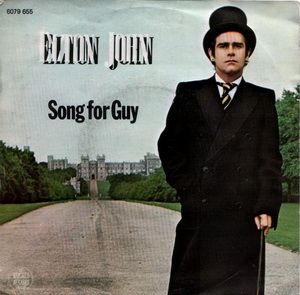
"Song for Guy" is a mainly instrumental piece of music by English musician Elton John. It is the closing track of his 1978 album, A Single Man.
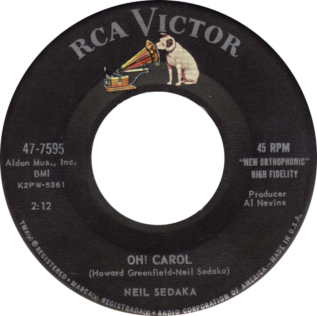
"Oh! Carol" is an international hit written by Neil Sedaka in 1958. Co-written with Howard Greenfield, the song is noted for Sedaka's spoken recitation of the verse, the second time around.

"Dreamin'" is a song recorded by Cliff Richard from his 1980 album, I'm No Hero. The track was the first of three singles released and was the biggest hit from the album, becoming a top-ten hit in numerous countries including the UK and the US where it became his third and last top ten hit.

"The Day I Met Marie" is a song by Cliff Richard, released as single in August 1967. The song was written by Hank Marvin and produced by Norrie Paramor.
"I'll Come Running" is a song written by Neil Diamond. It was first released by Diamond in July 1966 as the B-side to his US top-ten single "Cherry, Cherry", before being included on his debut album The Feel of Neil Diamond, released in August 1966. The song was later covered by Cliff Richard and released as a single in June 1967; it peaked at number 26 in the UK Singles Chart.
















